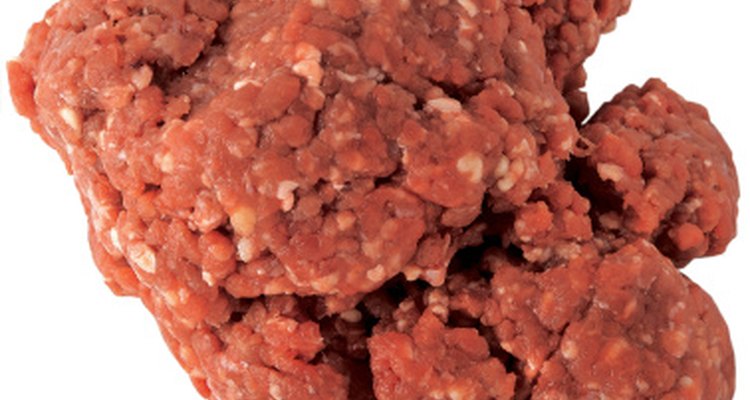
Ground beef is used in sauces, hamburger patties and pastas. It is prevalent in America, thanks to fast food burgers and neighborhood restaurants serving meatloaf and casseroles. The USDA recommends cooking or freezing ground beef within two days of purchasing it to protect its quality. Sticky or slimy beef with an odd odor is probably spoiled.
Pathogenic Bacteria
Ground beef is especially vulnerable to growing bacteria, since more of it is exposed to the air than if it were a solid cut of meat. Pathogenic bacteria can grow in beef that has spoiled due to lack of or insufficient refrigeration. Escherichia coli O157:H7, Salmonella, Staphylococcus aureus and Campylobacter jejuni are odorless and can't be spotted, but they thrive in low temperatures and cause food poisoning in humans. Food poisoning leads to diarrhea and vomiting, and it happens to up to 81 million Americans a year.
Spoilage Bacteria
Bacteria also grow in meat which remains refrigerated or frozen for too long. Refrigerators should be kept at 40 degrees Fahrenheit or below at all times. Naturally spoiled meat can carry a bacterium called Listeria monocytogenes and cause various illnesses which at first manifest as flu-like symptoms. Spoilage bacteria can lead to meningitis, encephalitis and septicemia. It can also lead to intrauterine or cervical infections among pregnant women.
Complications
According to the U.S. Food and Drug Administration, spoilage bacteria can manifest symptom-free in healthy individuals, with target populations of cancer patients, the elderly, the young and pregnant women suffering the most. The mortality rate of active illnesses resulting from Listeria monocytogenes is around 70 percent with less than 500 deaths per year in the United States.
Considerations
Spoiled ground beef is sticky to the touch and often tastes rotten and unappealing. Most Americans avoid cooking spoiled ground beef, and spoiled food in general, because of its unpleasant odor and appearance. Eating spoiled meat is not common in modern, industrial countries, but populations in many areas of the Middle East and Africa continue to make use of unrefrigerated, less-than-fresh meat, and the Inuit purposely consume spoiled fish as a delicacy, as many ancient cultures did. However, it is always safer to consume fresh meat and avoid possible exposure to bacteria and illness rather than eat questionable food.
Related Articles

What Does Spoiled Meat Smell Like When ...

How to Slice a Roast for Jerky

Rules for Thawing and Refreezing Meat

The History of Smoking Meat

How Fast Does Cooked Spaghetti Squash ...

If Chicken Smells Bad Can You Still ...

If Meat Is Frozen, How Long Does It ...

Why Is It Hard for Humans to Eat Raw ...

How Long Is Cooked Chicken Good?

How Can I Tell If Lunch Meat Has Gone ...

Can You Cook Meat Gone Bad?

How Long Can a Bagel With Cream Cheese ...

Ham Nutrition Information

What Foods Provide Calcium D-Glucarate?

Staple Foods in Greek Culture

How to Slice Round Steak for Jerky

How to Know If Pork Chops Have Gone Bad

Symptoms of Food Poisoning With Oysters

How Long Does It Take for Pork to Spoil ...

How Do I Tell If Pork Has Turned Bad?
References
Writer Bio
Lauren Tyree started writing professionally in 2010 as a staff writer for Poptimal. She has penned articles and essays since childhood. Tyree earned her Bachelor of Arts in sociology at Vassar College and her Master of Arts in communication at Regent University.
Photo Credits
Stockbyte/Stockbyte/Getty Images